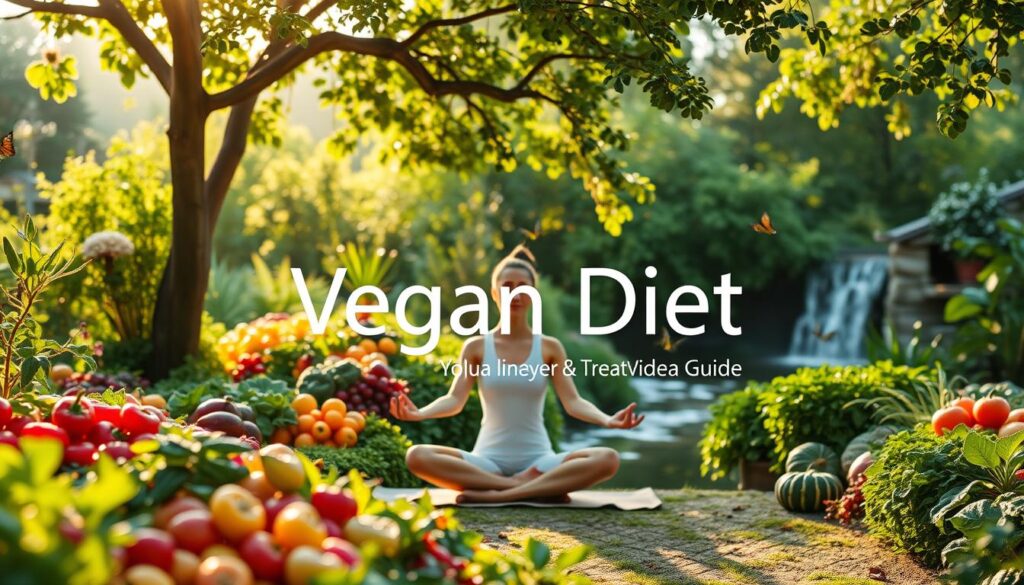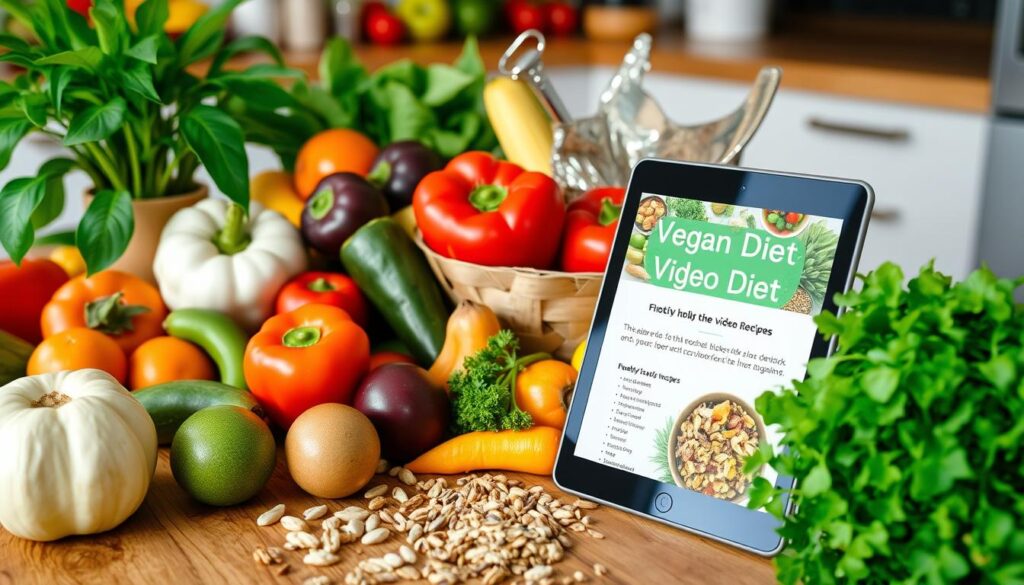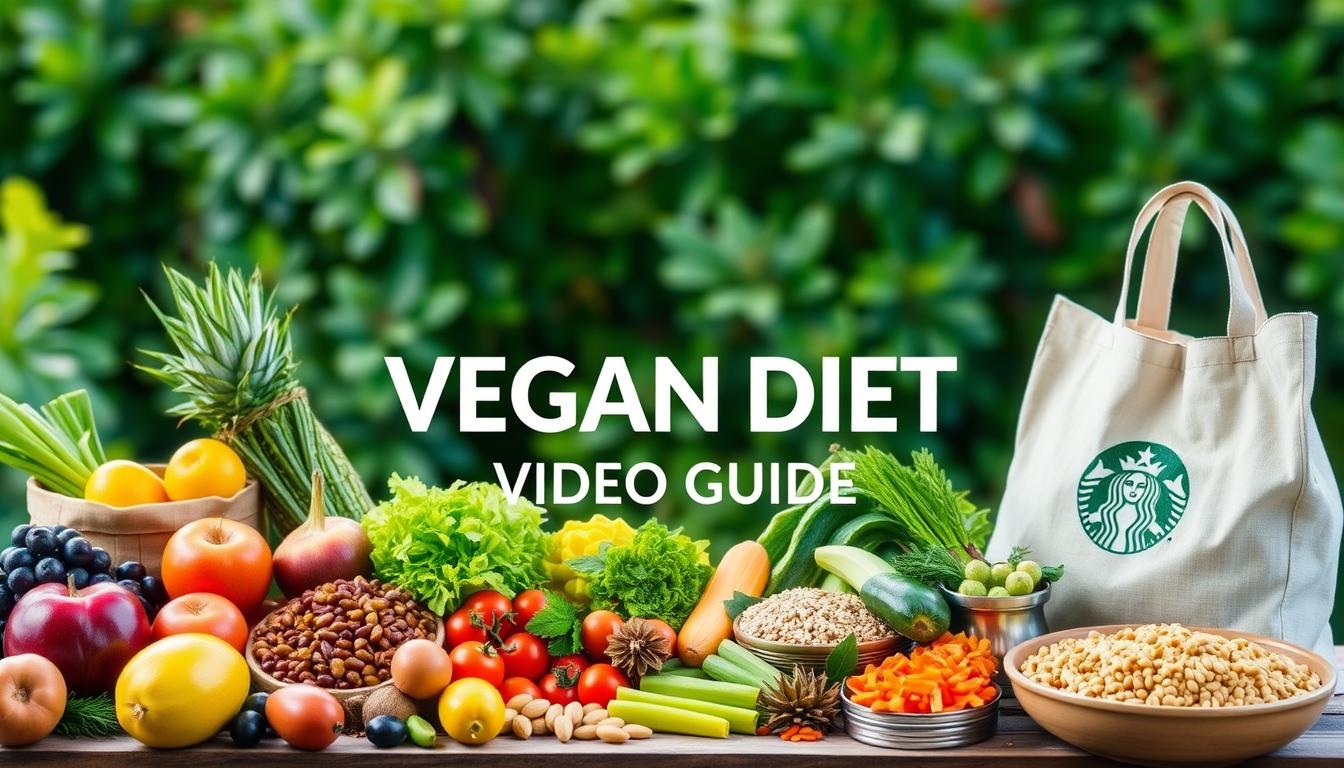Starting a vegan journey can transform not only your health but your entire lifestyle. Veganism, unlike vegetarianism, involves embracing a completely plant-based way of eating and living—free from animal products. The benefits of a vegan diet range from improved heart health to a reduced environmental footprint. This vegan lifestyle guide is designed to help you understand plant-based eating habits, explore the difference between veganism vs vegetarianism, and discover essential vegan supplements that support a balanced diet. Whether you’re just curious or ready to dive in, this guide will help you begin your journey with confidence and clarity.
If you care about animals, want to help the planet, or just feel better, this guide is for you. It will help you understand veganism and vegetarianism. You’ll also learn about vegan nutrition and how to start your vegan journey.
Key Takeaways
- Understand the core principles and definitions of veganism and plant-based diets
- Explore the health benefits of adopting a vegan lifestyle, including improved cardiovascular health, weight management, and reduced risk of chronic diseases
- Discover practical strategies for transitioning to a vegan diet, from clearing out your pantry to stocking up on delicious plant-based options
- Learn about the essential nutrients required for a well-balanced vegan diet and effective meal planning techniques
- Recognize the intersection between mindfulness and veganism, and how to cultivate a more thoughtful, sustainable approach to food and living
- Uncover the environmental impact of veganism and practical steps to reduce your carbon footprint through eco-friendly vegan practices
- Discover a wealth of vegan resources, including recipes, communities, and support networks to help you thrive on your vegan journey
Understanding Veganism and Plant-Based Diets
Veganism and plant-based diets are becoming more popular. People want to live healthier and more sustainably. But what do these terms mean, and how are they different from vegetarianism? Exploring these differences can help us understand these choices better.
Ready to embrace a healthier lifestyle? Discover the vegan diet and its benefits here: vegan.learnnow.top
Defining Veganism and Plant-Based Eating
Veganism is more than just a diet. It’s a lifestyle choice that rejects animal cruelty for any reason. Vegans eat only plant-based foods, avoiding meat, dairy, eggs, and honey. They also don’t use leather, wool, or other animal products.
A plant-based diet, however, focuses on eating foods from plants. This includes fruits, vegetables, grains, and more. It might not exclude animal products entirely, unlike veganism.
Veganism vs. Vegetarianism: What’s the Difference?
Many people confuse veganism with vegetarianism. But they are not the same. Vegetarians don’t eat meat, poultry, or seafood but may still eat dairy and eggs. Vegans, however, avoid all animal products, including dairy and eggs.
| Veganism | Vegetarianism |
|---|---|
| Excludes all animal-derived products, including meat, dairy, eggs, and honey. | Excludes meat, poultry, and seafood, but may include dairy products and eggs. |
| Extends beyond just dietary choices, encompassing a lifestyle that avoids the use of animal-based materials and products. | Primarily focuses on dietary choices, with less emphasis on broader lifestyle implications. |
| Driven by ethical considerations and a desire to eliminate animal exploitation and cruelty. | May have various motivations, such as health, environmental, or ethical concerns. |
Knowing the differences between veganism, plant-based diets, and vegetarianism helps us make better choices. These choices reflect our personal values and goals.
Health Benefits of Embracing a Vegan Lifestyle
Choosing a vegan diet brings many health perks beyond just losing weight. Studies show that a plant-based diet boosts overall health, fights chronic diseases, and even improves mental health.
One big plus of a vegan diet is lowering heart disease risk. Vegans avoid animal products, which are often full of bad fats and cholesterol. This leads to better blood pressure, cholesterol, and a lower chance of heart attacks and strokes.
- Improved heart health
- Reduced risk of type 2 diabetes
- Lower blood pressure
- Enhanced immune function
- Potential for weight loss
A vegan diet also cuts down on certain cancers like colon, breast, and prostate. This is because plant foods are rich in antioxidants, fiber, and phytochemicals. These help prevent cell damage and stop tumors from growing.
“Adopting a vegan lifestyle can be a transformative step towards better health and longevity.”
Also, plant-based nutrition is good for your mind. Vegans might feel less depressed and anxious. This is because plant foods are anti-inflammatory and support brain health and mood.
Curious about veganism? Start your journey today and transform your health: vegan.learnnow.top
Looking to boost your health, prevent diseases, or just feel great? A vegan diet can lead to a healthier, more eco-friendly life.
Transitioning to a Vegan Diet: A Step-by-Step Guide
Starting a vegan diet is exciting and rewarding. But, it’s key to have a solid plan. Here’s a guide to help you smoothly switch to a plant-based lifestyle.
Clearing Out Your Pantry and Fridge
First, check out your pantry and fridge. Look for non-vegan items like dairy, eggs, and animal-based foods. Then, either donate or throw them away responsibly. This clears space for new vegan foods.
Exploring Vegan Food Options
Vegan food is diverse and tasty. Learn about plant-based proteins like tofu, tempeh, and seitan. Also, get to know whole grains, legumes, nuts, seeds, and fresh produce. These will be your vegan meal bases.
Make a list of vegan essentials for easier shopping. Look for vegan brands in stores or online. Keep up with vegan trends to keep your meals interesting and healthy.
| Vegan Protein Sources | Vegan Whole Grains | Vegan Produce |
|---|---|---|
| Tofu, tempeh, seitan | Quinoa, brown rice, oats | Leafy greens, broccoli, sweet potatoes |
| Beans, lentils, peas | Whole wheat bread, pasta | Berries, avocados, mushrooms |
| Nuts, seeds, nut butters | Buckwheat, millet, amaranth | Citrus fruits, cruciferous veggies |
Changing to a vegan diet takes time. Be patient and keep your pantry stocked. Soon, you’ll enjoy tasty and healthy vegan meals.
Vegan Diet Basics: Nutrients and Meal Planning
Starting a vegan lifestyle is a big step. It means thinking carefully about what you eat. Knowing about vitamins, minerals, and meal planning is key to staying healthy and feeling great.
Essential Nutrients for a Well-Balanced Vegan Diet
A plant-based diet is full of good stuff. But, it’s important to make sure you get everything your body needs. Here are some nutrients you should focus on:
- Protein: Eat a mix of legumes, tofu, tempeh, seitan, nuts, and seeds.
- Iron: Leafy greens, lentils, cashews, and fortified cereals are great sources.
- Calcium: Use dairy-free milk, leafy greens, and fortified foods to get enough.
- Vitamin B12: Take a B12 supplement or eat fortified foods to avoid a lack.
- Omega-3 fatty acids: Chia seeds, flaxseeds, and walnuts are good sources.
Meal Planning and Grocery Shopping Tips
Good meal planning and smart shopping are key for a balanced vegan diet. Here are some tips to help you:
- Plan your meals ahead to include a variety of healthy foods.
- Keep your pantry and fridge stocked with vegan basics like whole grains, legumes, nuts, seeds, and fresh veggies.
- Try new vegan recipes and explore different cuisines to keep your meals exciting.
- Check nutrition labels when you shop to find vegan-friendly products and meet your nutritional needs.
- Think about getting a few important vegan supplements, like B12, to help your diet.
By knowing what nutrients you need and planning your meals well, you can start a journey to better health, mindfulness, and sustainability.
Learn how a plant-based diet can boost your well-being and help the environment: vegan.learnnow.top
How to Start a Vegan Diet, Vegan Diet Basics, Sustainable Vegan Living
Starting a vegan lifestyle can change your health, help the planet, and align with your values. This guide will help you understand vegan diets and sustainable vegan living. It’s perfect for beginners or those wanting to dive deeper into plant-based living.
Laying the Foundation: Vegan Diet Basics
First, learn about a plant-based diet. Vegans eat whole foods like fruits, veggies, grains, legumes, nuts, and seeds. They avoid animal products like meat, dairy, and eggs. This way, they get all the nutrients they need.
Transitioning with Ease: Practical Tips
Switching to a vegan lifestyle might seem hard, but it can be easy. Start by replacing non-vegan foods with plant-based ones. Try new vegan recipes and ingredients. Experiment to find what you love.
Sustainable Vegan Living: Reducing Your Footprint
Veganism is more than just food. It’s about living sustainably too. Reduce waste, choose eco-friendly products, and support ethical businesses. These actions help the planet.
Every vegan journey is unique. Be patient, kind to yourself, and open to learning. By starting a vegan diet, you improve your health and help the environment.
Learn the difference between vegetarianism and veganism at Harvard Health: Harvard Health – Vegetarian vs. Vegan Diet
Mindfulness and Veganism: Embracing a Holistic Approach
The vegan lifestyle is growing, and it’s key to see how mindfulness fits into it. Mindfulness helps vegans enjoy their plant-based diet more. It makes their wellness journey more complete.
Practicing Mindful Eating
Mindful eating is at the core of this connection. Vegans who practice mindfulness find that eating becomes a special experience. They learn to appreciate every bite, slowing down to enjoy the taste, texture, and smell of their food.
This way, vegans connect more with their bodies and the planet. They feel thankful for the food that makes their lifestyle possible. This leads to a stronger commitment to taking care of the environment.
- Mindful eating helps vegans enjoy their meals fully, focusing on the food they eat.
- It makes them appreciate the effort that goes into their vegan lifestyle, leading to a deeper connection with nature.
- It also helps vegans listen to their bodies, making choices that are good for their health and well-being.
Mindfulness takes vegans’ journey to a new level. It makes their plant-based diet a way to care for their body, mind, and spirit. This shows how powerful it is to live mindfully as a vegan.

Sustainable Vegan Living: Reducing Your Environmental Impact
Choosing a vegan lifestyle is good for your health and the planet. As more people focus on living sustainably, vegan practices are getting noticed. They help reduce our environmental footprint.
Make the switch to a sustainable, vegan lifestyle with this beginner-friendly guide: vegan.learnnow.top
Eco-Friendly Vegan Practices
Vegan living is more than just food. It’s about living in a way that’s kind to the Earth. Here are some ways to live more sustainably:
- Drink less water: Vegan diets need less water than meat-based diets. This is because plants use less water to grow.
- Don’t waste food: Plan your meals and use all parts of your food. This cuts down on greenhouse gas emissions from waste.
- Choose green transport: Walk, cycle, or take public transport. This lowers your carbon footprint from personal travel.
- Support green brands: Buy from vegan and eco-friendly brands. They focus on sustainability and fair practices.
- Reduce, reuse, recycle: Try to use less, reuse what you can, and recycle the rest. This helps conserve resources and reduce waste.
| Sustainable Vegan Practice | Environmental Impact |
|---|---|
| Plant-based diet | Less greenhouse gas emissions, water, and land use |
| Minimizing food waste | Less methane emissions and resources used in food production |
| Eco-friendly transportation | Less fossil fuel use and air pollution |
| Supporting sustainable brands | Encourages ethical and green business practices |
| Reduce, reuse, recycle | Saves natural resources and reduces landfill waste |
By following these vegan practices, you can greatly reduce your environmental impact. Every small step towards a sustainable vegan lifestyle helps create a better future.
Vegan Resources: Recipes, Communities, and Support
Starting a vegan journey is exciting and rewarding. It’s important to have the right resources. You’ll find delicious vegan recipes, connect with vegan communities, and get vegan support here.
Vegan Recipe Databases
Finding tasty and healthy plant-based meals is easy with these online recipe hubs:
- The Minimalist Baker: Offers simple, vegan-friendly recipes with 10 ingredients or less.
- Oh She Glows: A vibrant resource for wholesome, vegan recipes and meal planning.
- Forks Over Knives: Provides a wide range of vegan recipes and meal ideas for every occasion.
Vegan Community Connections
Being part of a supportive vegan community can make your journey richer and more insightful:
- Reddit’s r/vegan: A thriving online forum for vegan discussions, advice, and camaraderie.
- Facebook Groups: Search for local or interest-based vegan groups to connect with fellow enthusiasts.
- Meetup.com: Explore vegan meetup groups in your area for in-person events and gatherings.
Vegan Wellness and Support
These resources can help you navigate the vegan lifestyle:
| Resource | Description |
|---|---|
| Veganuary | A global movement encouraging people to try a vegan diet for the month of January. |
| The Vegan Society | A comprehensive website offering vegan information, guidance, and community support. |
| The Happy Pear | A wellness brand providing vegan recipes, lifestyle tips, and educational resources. |
These resources are here to help you thrive in your vegan journey. They support your plant-based diet and vegan lifestyle.

Conclusion
As we wrap up this guide, it’s clear that going vegan can change your life. It leads to better health, more mindfulness, and helps the planet. A vegan diet is full of nutrients and good for animals and the environment.
We’ve covered the basics of veganism and its health perks. We also shared how to start a vegan lifestyle. You can now stock up on healthy foods and cook tasty, vegan meals.
Keep moving forward on this journey, even if it’s not perfect. Try new vegan recipes and join a community of like-minded people. This way, you’ll take care of yourself and help the planet. Start your vegan journey and see the amazing changes it can bring.
Explore the benefits of veganism for your body and the planet. Start here: vegan.learnnow.top
FAQ
What is the difference between veganism and vegetarianism?
Vegans don’t eat any animal products, like dairy, eggs, and honey. Vegetarians eat dairy and eggs but avoid meat, poultry, and seafood.
What are the health benefits of following a vegan diet?
A vegan diet can lower your risk of heart disease, type 2 diabetes, and some cancers. Vegans often have a lower body mass index, blood pressure, and cholesterol than non-vegans.
How can I transition to a vegan diet?
Start by getting rid of non-vegan foods in your kitchen. Look for plant-based foods and try new recipes. Slowly add more vegan meals to your diet.
What are the essential nutrients I need to consider on a vegan diet?
Focus on protein, iron, calcium, vitamin B12, omega-3 fatty acids, and iodine. Eat a variety of plant-based foods and consider supplements if needed.
How can I make my vegan lifestyle more sustainable?
Reduce food waste and choose local, organic produce. Use eco-friendly products and packaging. Lower your carbon footprint by using less energy and transportation.
How can I incorporate mindfulness into my vegan diet and lifestyle?
Eat mindfully by enjoying your food and listening to your body. Practice meditation and yoga to connect with veganism.
Where can I find vegan recipes, communities, and support resources?
Look online for vegan recipes, communities, and support. There are many resources, including blogs, social media groups, and local meetups. They can help you find new recipes and connect with others.
